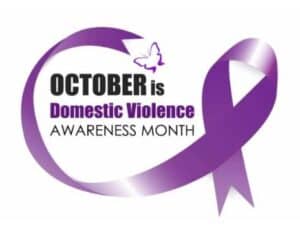October is Domestic Violence Awareness Month, a critical time to highlight an often-overlooked but deeply interconnected issue—how domestic violence impacts mental health. The physical harm caused by domestic violence is evident and tragic, but the emotional and psychological toll is equally profound. Survivors of domestic violence often face mental health struggles that can last long after physical wounds heal, making it essential to address both aspects in tandem.
What is Domestic Violence?
Domestic violence is a pattern of abusive behavior that is used by one partner to gain or maintain power and control over another intimate partner. Domestic violence is not limited to physical violence and can take many forms.
Examples of abusive behavior include:
- physical
- sexual
- emotional
- economic
- psychological
- technological
The Hidden Costs of Domestic Violence on Mental Health
- Domestic violence (DV) is not just about physical violence. It can also include emotional abuse, financial control, sexual coercion, and psychological manipulation. These various forms of abuse create an environment of fear, helplessness, and isolation that can lead to severe mental health consequences, including:
- Post-Traumatic Stress Disorder (PTSD): Many survivors of domestic violence develop PTSD, characterized by flashbacks, hypervigilance, nightmares, and overwhelming feelings of fear, even in safe environments. The constant threat of violence leaves survivors in a state of chronic stress.
- Depression: Emotional abuse, in particular, erodes self-esteem, leaving survivors feeling worthless, helpless, and isolated. These feelings can culminate in deep depression, sometimes making it difficult for them to leave abusive situations or seek help.
- Anxiety: The unpredictability of abuse—never knowing when the next attack will come—leads many survivors to develop anxiety disorders. This can manifest as generalized anxiety, panic attacks, or obsessive-compulsive behaviors aimed at controlling what little they can in an otherwise chaotic environment.
- Substance Abuse: In many cases, survivors turn to substances like alcohol or drugs as coping mechanisms to dull the emotional pain of their experiences, which can compound mental health issues and make recovery even more challenging.
- Suicidal Ideation: The combination of mental health struggles, isolation, and hopelessness may lead some survivors to believe that there is no escape from their situation, resulting in suicidal thoughts or attempts.
The Cycle of Abuse and Mental Health
Domestic violence and mental health issues often create a vicious cycle. Abuse leads to mental health struggles, and these struggles can make it harder for survivors to leave their abusive situations. Abusers may also manipulate mental health conditions to control their partners, using tactics like gaslighting or telling survivors that no one else will want them due to their “mental instability.” This further traps the victim in the cycle of abuse.
Addressing Mental Health in Domestic Violence Interventions
For survivors of domestic violence, addressing mental health is crucial for both immediate safety and long-term recovery. Mental health care should be integrated into every stage of intervention:
- Screening and Trauma-Informed Care: Healthcare providers, social workers, and counselors need to be trained in recognizing signs of domestic violence and providing trauma-informed care. This means understanding the psychological impact of abuse and offering compassionate, non-judgmental support.
- Access to Counseling and Support Groups: Therapy can help survivors process their trauma, rebuild self-esteem, and develop coping mechanisms. Support groups offer a safe space where survivors can share their stories with others who understand their experiences, which can be empowering and healing.
- Safety Planning: Safety planning is essential in DV cases, but mental health professionals can offer added support by helping survivors manage anxiety or depression, which may impair their ability to make clear decisions. Cognitive-behavioral techniques or mindfulness practices can help survivors regulate emotions and regain a sense of control.
- Reducing the Stigma: It’s important to reduce the stigma around both domestic violence and mental health struggles. Survivors often feel shame for staying in abusive relationships, for needing help, or for developing mental health issues. Communities must foster an environment where seeking help is seen as a brave and necessary step.
The Importance of Awareness and Education
Raising awareness about the mental health consequences of domestic violence is vital, not only for survivors but for everyone in society. Education can lead to better intervention strategies and more compassionate, comprehensive care. It also helps break the isolation that many survivors experience, letting them know they are not alone.
If you or someone you know is experiencing domestic violence, understand that help is available. Reach out to local shelters, hotlines, and counseling services. Ending the cycle of violence and addressing its mental health impacts are both possible with the right support.
This Domestic Violence Awareness Month, let’s commit to raising our voices for those who may not be able to speak out. Let’s work to create a society where everyone can live free from fear, and where mental health is part of the conversation in domestic violence recovery.
Resources:
– National Domestic Violence Hotline: 1-800-799-7233 (SAFE)
– The National Coalition Against Domestic Violence: www.ncadv.org
– National Alliance on Mental Illness: www.nami.org
By spreading awareness, we can contribute to a future where survivors of domestic violence are met with understanding, support, and the mental health care they deserve.

